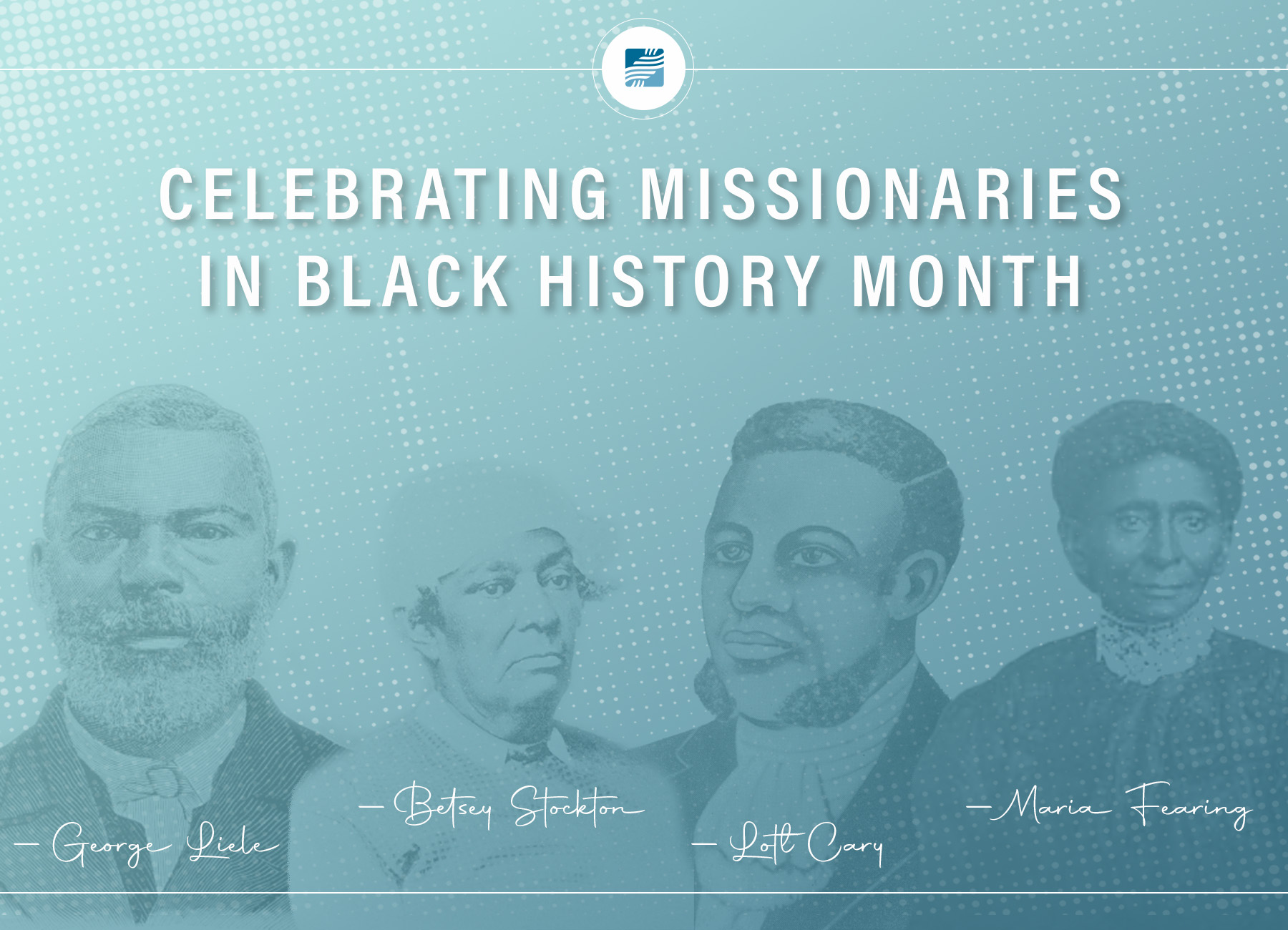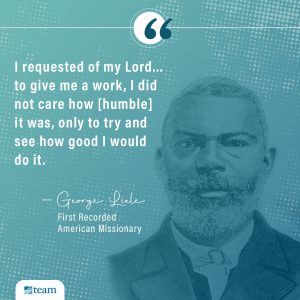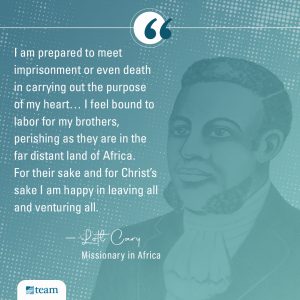
Missionary Life
Early African American Missionaries Who Changed the World for Christ
February 25, 2022
by Suzanne Pearson

When most people think of early Western missionaries, names like William Carey, Adoniram Judson, and TEAM’s own Fredrik Franson come to mind. Alongside these well-known evangelists were unsung African American heroes of the faith, dedicated men and women responding to the call of the Great Commission. In celebration of Black History Month, we are honored to share a few of those stories.
George Liele

The first recorded American missionary was African American. His name was George Liele and he was a former Virginia-born slave who began ministering in Jamaica in 1783, a full decade before William Carey traveled from England to India.
Liele preached the Gospel, primarily to enslaved Jamaicans, and established churches on the island. By 1832, over 20,000 Jamaicans had become believers in Christ as a result of Liele’s ministry. In addition, Liele encouraged the practice of making disciples who make disciples, sending missionaries from Jamaica to places as far away as Nova Scotia and Sierra Leone.
Liele was also a powerful voice for social change in Jamaica, advocating for the freedom of enslaved people on the island. Although Liele died before this dream became a reality, he is credited as a significant influence leading to the abolition of slavery in Jamaica in 1838.
Betsey Stockton

Betsey Stockton’s journey to the mission field was an unlikely one. Born as a domestic slave in the household of the President of the College of New Jersey (now Princeton University), Stockton gained her freedom as a teenager and attended night classes at the college. It was there on that college campus that she heard the Gospel and gave her life to Christ.
Stockton soon felt called to share her newfound faith as a missionary to the islands of Hawaii. She scrimped and saved to raise the finances needed, and in 1822 joined a team of 11 missionaries, herself the only African American, on the perilous journey by sea.
In Hawaii, Stockton helped establish schools and taught history, English, Latin, and algebra, all while learning the local language. She knew that education was the key to not only a better life for the people she encountered but also the key to understanding and receiving the truths of the Bible. Stockton would later go on to establish schools for underprivileged children in Philadelphia and Canada.
Betsey Stockton, the first unmarried female American missionary, is now considered among the most noted educators in U.S. history. In their book, Profiles of African American Missionaries, Robert Stevens and Brian Johnson said of Stockton, “Betsey may have been born into slavery but she emerged as a religious and academic pioneer.
Lott Cary

Lott Cary was born into a family of great faith. His father, mother, and grandmother served as examples of a life devoted to Jesus, and in his early 20’s, Cary put his faith in Christ.
Though still a slave, Cary obtained paid work in a warehouse, and at the same time went to night classes to learn to read and write. Over the next several years, Cary was promoted to supervisor in the warehouse and saved enough money to buy his freedom. But rather than pursuing continued success or financial gain, he felt called to the mission field in Africa.
Cary served first in Sierra Leone and later in Liberia, where not only did he significantly advance the Gospel, but also served as a government inspector and health officer. Prior to his death, Cary was even named the acting governor of Liberia.
Cary is now considered a pioneer to Christian work across Africa, and many credit his legacy as paving the way for Liberia’s independence as a free nation.
Maria Fearing

At the age of 56, many people might look to retirement, feeling like opportunities to impact the world are behind them. Not so for Maria Fearing.
At the end of the Civil War, Fearing was in her late 20’s, suddenly free in her home state of Alabama but without direction or education. She learned to read and write at age 33 and trained to become a teacher. Fearing taught in local schools, saved money and bought her own home. Yet the stories she heard growing up of the unsaved souls in Africa never left her mind.
In 1894, Fearing was in attendance when missionary William Sheppard spoke of his ministry in the Congo and called others to join him. At the front of the line to heed this call was Maria Fearing. She was 56 years old and weighed all of 90 pounds, but she had a fierce passion to serve the Lord.
Upon arrival in the Congo, the conditions Fearing encountered were atrocious. The people suffered under horrific oppression from the Belgium-led government, and the trafficking of women and children was rampant. Fearing and her colleagues successfully rescued and rehabilitated dozens of young girls, established a group home for them, and led many people to Christ.
Over the years, Fearing became known throughout the region as “Mama Wamputu” which means, “Mother from Far Away” and when she passed away at the age of 99, she left a legacy of faithful believers in the Congo that now spans several generations.
To read more stories about amazing pioneers in cross-cultural missions, check out two great articles from our friends at Missio Nexus here and here.

